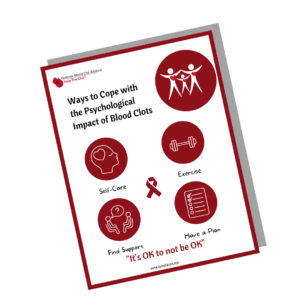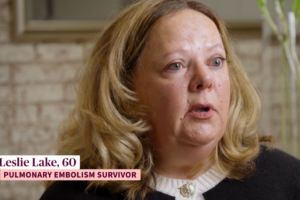Psychological Impact of Blood Clots
 It’s OK to not be OK.
It’s OK to not be OK.
After a blood clot diagnosis, you might be dealing with feelings of anxiety, depression, or other issues that may interfere with your mental health due to your diagnosis. A blood clot diagnosis can be scary and can come out of nowhere.
Don’t feel ashamed if you need to speak with a mental health professional to help you develop the tools to manage these emotions and a healthy mindset moving forward.
It’s ok to not be ok.
NBCA has created a resource for those who might be struggling mentally after a blood clot diagnosis, and need help starting their mental recovery. Download this mental health guide, or review some of the information below!
Ways to Cope with the Psychological Impact of Blood Clots
Download this guide now.
Self-Care
- Meditation is a practice that involves focusing or clearing your mind using a combination of mental and physical techniques that have many benefits on the body. Learn more about meditation.
- Journaling is simply writing down your thoughts and feelings to help understand them more clearly. It can help you gain control of your emotions and improve your mental health. Learn more about Journaling.
- The most common symptom after a blood clot is often exhaustion and fatigue. It’s important to be kind to yourself and rest when you need to. Read patient stories to learn from others about the road to recovery.
Exercise
- There are many health benefits to walking, including improved blood flow. Walking is a good place to start during your recovery. Set small walking goals for yourself and stay tuned to learn about NBCA’s walking group in 2023 by joining our email list.
- Exercising with others is a great external motivator. If you don’t have anyone in your local community, consider downloading Strava and get connected with a walking community online.
- Understand and manage your blood clot diagnosis with the resources and tools needed to regain strength and confidence as an athlete. Learn about joining Team Stop the Clot®.
Support
- Finding a therapist is good first step to building your support network. They can help with treatments, such as Cognitive Behavioral Therapy, or even refer you to a psychiatrist if considering medication may help improve your quality of life.
- Joining a support group is always encouraged. You will find others who have gone through a similar situation and can offer you insight. Join NBCA’s Facebook Support Group today.
- Finding valuable support, resources, and recovery guidance for individuals who have been impacted by blood clots is crucial. Consider learning from NBCA’s PEP Talks: Patients Educating Patients.
Have a Plan
- Know your risk for blood clots. The first and most important thing you can do to protect yourself from a recurrence is to learn your risk factors and eliminate any modifiable risk factors, such as smoking.
- Your providers play an important role in your care and should work together to ensure your optimal treatment. Learn who should be on your healthcare team by downloading our New Patient Guide.
- Please take your medication as prescribed. Skipping doses or stopping medication can cause those on anticoagulants to be at an increased risk of a life-threatening clot. Learn more about anticoagulants.
- Learn answers to common FAQ’s in the patient community to help you stay informed after a blood clot diagnosis.




